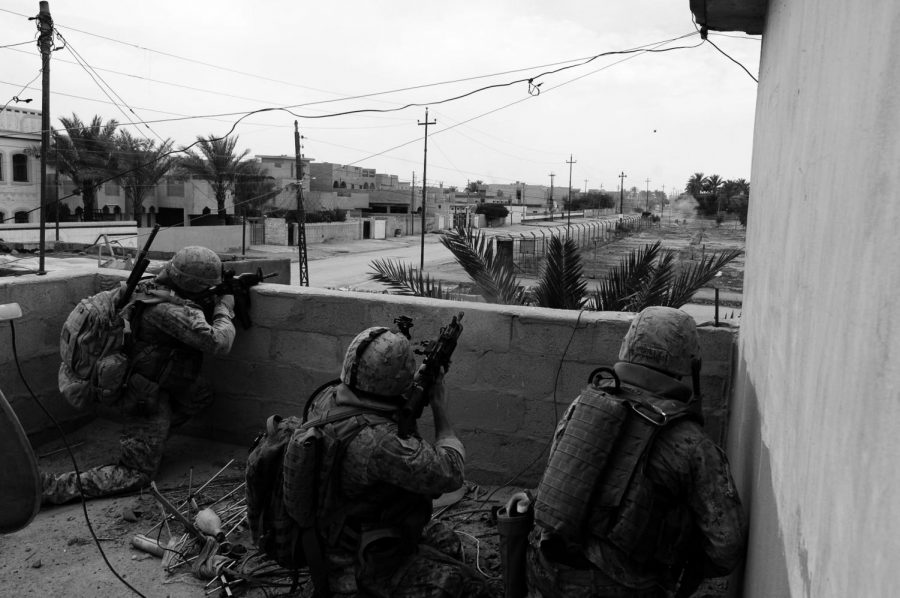The Iraqi–Kurdish Conflict
November 7, 2017
If someone asks just about any American what they think about independence, they will respond with resounding support. However, if you ask a Friends student what they think about Kurdish independence from Iraq, their face will probably go blank. For the many who do not know, Kurds are an ethnic group that reside in Turkey, Iraq, Syria, Iran and Armenia with their own language, culture, and history. The majority of them are Sunni Muslims. According to CNN, there are about 25,000,000 to 30,000,000 of them in the Middle East, but they have never had a permanent nation-state.The conflict between Iraqi and Kurdish peoples began with the fall of the Ottoman Empire, when borders had to be re-drawn all over the region. The Kurds were unable to establish an autonomous state, which isolated them from the neighboring groups, especially Iraq.
The strife has manifested with conflicts such as the aptly named First Iraqi-Kurdish War, The Second Iraqi-Kurdish War, and the Iran-Iraq War, in which the Kurds conspired against Saddam Hussein. On paper, the warring ended with the U.S. invasion of Iraq in 2003, but tensions remain high even today. Of registered voters, 72% appeared at polls on September 25th to vote for or against independence from Iraq, according to The New York Times. The New York Times also reports that 92.7% of Kurds voted in favor of independence. This doesn’t mean that there will be a declaration of independence any time soon, but it will trigger a series of advances toward the establishment of a Kurdish state.
Before they take radical action, they must first negotiate separation with Iraq. Iraqi leaders have refused negotiation, as they have deemed the vote illegal and decided to ignore the results. The Prime Minister of Iraq, Haider al-Abadi, declared to Parliament that he would not negotiate with the Kurds unless they dissolved the results.
The tensions continued to rise as al-Abadi called Iran to “coordinate military efforts”, despite his earlier statement that he wanted “no fighting among the people of the country”. Iran’s military is likely to comply with this request due to its concern that its own Kurdish population will revolt. Additionally, the US, the UK, and the United Nations warned the Kurds against the referendum. These global powers believe that independence will distract from the campaign against ISIS, and further destabilize the region. Conversely, the Iraqi government has continuously oppressed the Kurds with acts of genocide and war. Despite the severity and longevity of the conflict, the Friends community has revealed itself to be fairly uninformed. However, three students did express their sympathy with the conflict.
Zareef Khan ’19 stated: “The United Nation’s advising the Kurds against independence in current day context is a good idea, but it appears to not be that simple for the citizens, despite the need for union. Tensions between the Kurdish Iraqis and Iraq are still likely going to be present regardless of whether or not there is any active campaign for independence, which while helping to re-focus efforts towards the threat of ISIS, would not really bring a true union between the Kurds and Iraq. However, the advice of the UN makes a lot of sense because besides the fact that independence will further divide the region, a separation has the potential to lead to violence and to enduring hostility between the opposing sides. An example of this could be the initial separation of India (Hindu majority) and Pakistan (Muslim majority) along with other conflicts between the parties afterwards, as the tension and hostility between the two nations still lingers.” Khan underlines the duality of the conflict and the potential for increased hostility if the issue is not handled properly.
Hannah Blackwell ’20 also recognised the complexity of the matter. She emphasized the longevity of the connection with her remarks, “The conflict is very multi layered, and it seems like there is still historical malice between the two groups.” Hannah notices the intricacy of the conflict. She doesn’t arrive at a decisive solution, which mirrors the sentiments of many members of the Friends community: empathetic to the cause, but at a loss for what steps need to be taken in order to ensure a peaceful and timely resolution.
Lilia Machado ’20 saw a more clear solution: “The Kurds deserve separation from Iraq because of their history of being tortured by the Iraqi government and wanting independence for their people.” Machado can empathise with the humanitarian side of the Kurdish argument. She believes these are people who have endured many hardships, and are entitled to make a stand for autonomy.
Friends school students have varying opinions on this conflict. Some can relate it to other historical events, some note its duality, and some have more decisive views. It is hard to say what will happen with this conflict in the more distant future, but for now it seems like the progress will be slow. For the Iraqi Kurds to gain independence, they must first convince the Iraqi government to let them secede, which does not seem likely to happen any time soon. President Trump’s last decision regarding this issue was to assist in arming the Kurds. However, since then, his position has been ambiguous. Other American government officials have spoken out against the referendum. It is crucial that Americans stay informed and hope that no more blood is shed over this issue.































